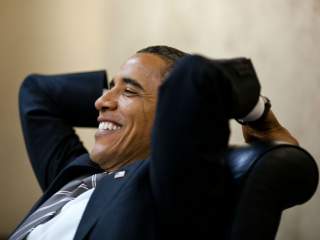The Obama Doctrine: Where Too Little Meets Too Late
We didn't need a law professor. We needed a commander-in-chief.
Jeffrey Goldberg’s lengthy article in the latest issue of the Atlantic has generated a great deal of discussion about President Barack Obama’s approach to foreign affairs. Drawing from interviews with the president, some of his chief foreign policy and national security advisors, and contemporaneous reporting of crisis events as they unfolded, Goldberg pieces together a mosaic illustrating Obama’s personal philosophy regarding America’s interests, its role in the world, the rationale for getting involved (or refraining from such) and what it means to be “smart” in dealing with the world’s major actors.
The magazine also provides side commentaries interpreting Goldberg’s word-picture. Derek Chollet, for example, selects passages to make the case for Obama’s wisdom and effectiveness. In contrast, Niall Ferguson and Kori Schake are quite critical of Obama’s worldview and related policies, mining Goldberg’s report for evidence of Obama’s intellectual arrogance, his foreign policy’s strategic incoherence and his refusal to acknowledge the costs of his (in)decisions.
Count me among the Ferguson/Schake camp. Intentionally or not, Goldberg has documented a president convinced of his own intellectual superiority, and blind to the logical inconsistencies inherent in his views. The disconnect between the president’s interpretation of events and reality can only leave one wondering why the U.S. hasn’t fallen even further under his leadership.
Here are some key takeaways from Goldberg’s fascinating article:
• Though often unhappy and disillusioned by how things turn out, Obama doesn’t believe that the results arose from how he elected to handle situations. Frequently opting to remain aloof from the messiness of crises, he appears to miss the point that leadership requires active involvement, not just rhetoric.
• Obama doesn’t act until things get very bad. Then, when forced by circumstances to act, he acts hesitantly and minimally, later complaining about the lack of good options and outcomes. For example, the president complains that the Middle East is “consuming us,” without considering this might be because U.S. involvement has been tepid and half-hearted—just enough to complicate the situation further, but not enough to shape conditions to favor U.S. interests.
• He cites Libya as evidence that U.S. action seldom helps—because the situation was either hopeless to begin with or poorly handled by the locals. What he doesn’t acknowledge is that there was no follow-through. If one decides at the beginning not to commit the forces or effort needed to manage the post-conflict situation, one forswears the ability to shape events once the bombs stop falling.
• Obama believes “it was not his business to stop Russia from making what he thought was a terrible mistake [in Syria]. ‘They are overextended. They’re bleeding… And their economy has contracted for three years in a row, drastically.’” That’s an incredibly cold-blooded analysis—one that omits from the equation Syria’s half-million dead, two million wounded, five million refugees outside the country and over six million internally displaced.
• Obama says, “[We] have to be very clear about what our core interests are and what we’re willing to go to war for.” That’s a given. But judging from the lack of meaningful commitment to change conditions relative to crises in much of Africa, the Middle East, the Asia-Pacific and even Europe, apparently not much reaches that level in today’s world. However, “climate change worries [him] profoundly.”
• Another eyebrow-raiser: “[If] you look at how we’ve operated in the South China Sea, we have been able to mobilize most of Asia to isolate China in ways that have surprised China.” Really? Their alleged surprise hasn’t caused Beijing to miss a beat in its island-building campaign of territorial expansion.
• Though frustrated that “nobody talks about me ordering 30,000 more troops into Afghanistan,” Obama fails to note that the military commanders tasked to achieve his stated policy objectives requested twice that amount. Is it any wonder the country is falling back into chaos and America has minimal influence among any of the major players?
• Obama argues that history is “bending” in his direction, that the historical record shows that tyrants fade away while humanity generally treads an upward path. Consequently, he implies, there is little need to engage in costly wars since the bad guys will ultimately defeated… by time, if nothing else. But even though history will “bend” to the detriment of tyrants, they can cause massive death and destruction before the bending is done. While the U.S. cannot commit to righting every wrong, surely it has an interest in mitigating the damage in the worst of circumstances.
In foreign affairs, President Obama has been eager to “engage” America’s foes conversationally. But he has consistently refused to act early, when options are more plentiful and bad conditions can be dealt with at lesser cost.
Inaction, timidity, half-hearted gestures, and concessions to aggressive and destructive powers have created a more dangerous environment. Old friends have been betrayed; enemies have been emboldened and, at times, outright rewarded. Meanwhile, hundreds of thousands have needlessly died, and millions have had their world profoundly upended.
It’s possible, of course, that decades from now, historians will validate Chollet’s view of Obama’s time in office. But it’s far more likely that Ferguson and Schake will be substantiated.
Dakota L. Wood is a Senior Research Fellow in The Heritage Foundation’s Center for National Defense.
Image: Flickr/The White House

